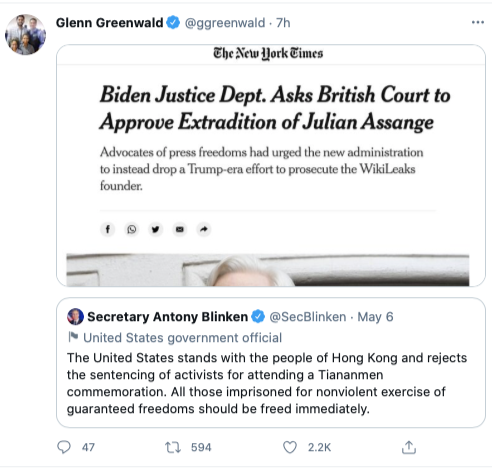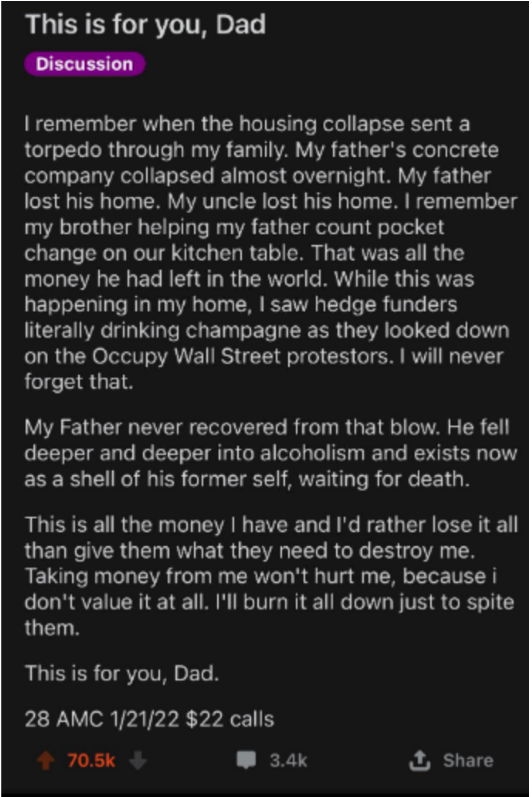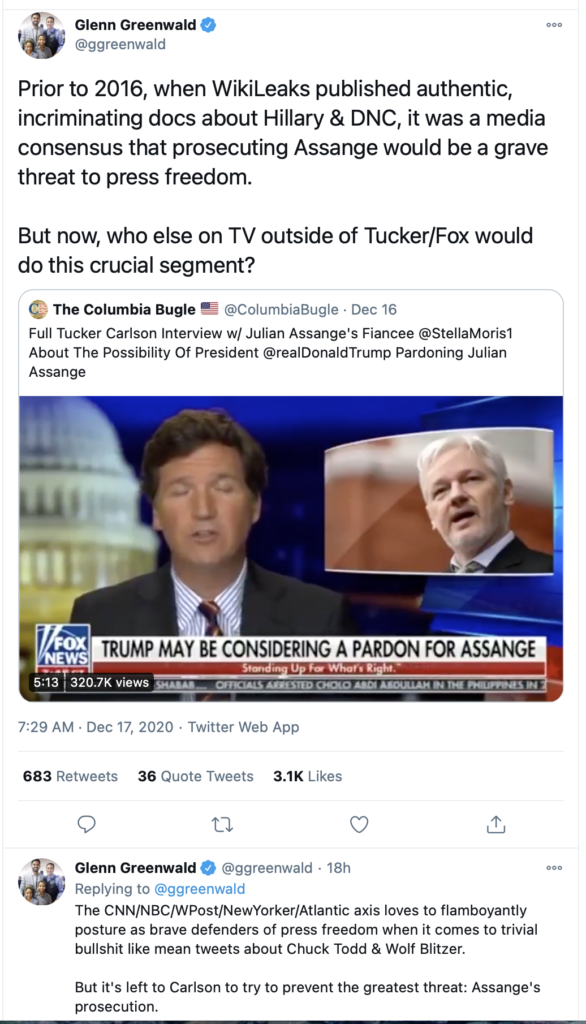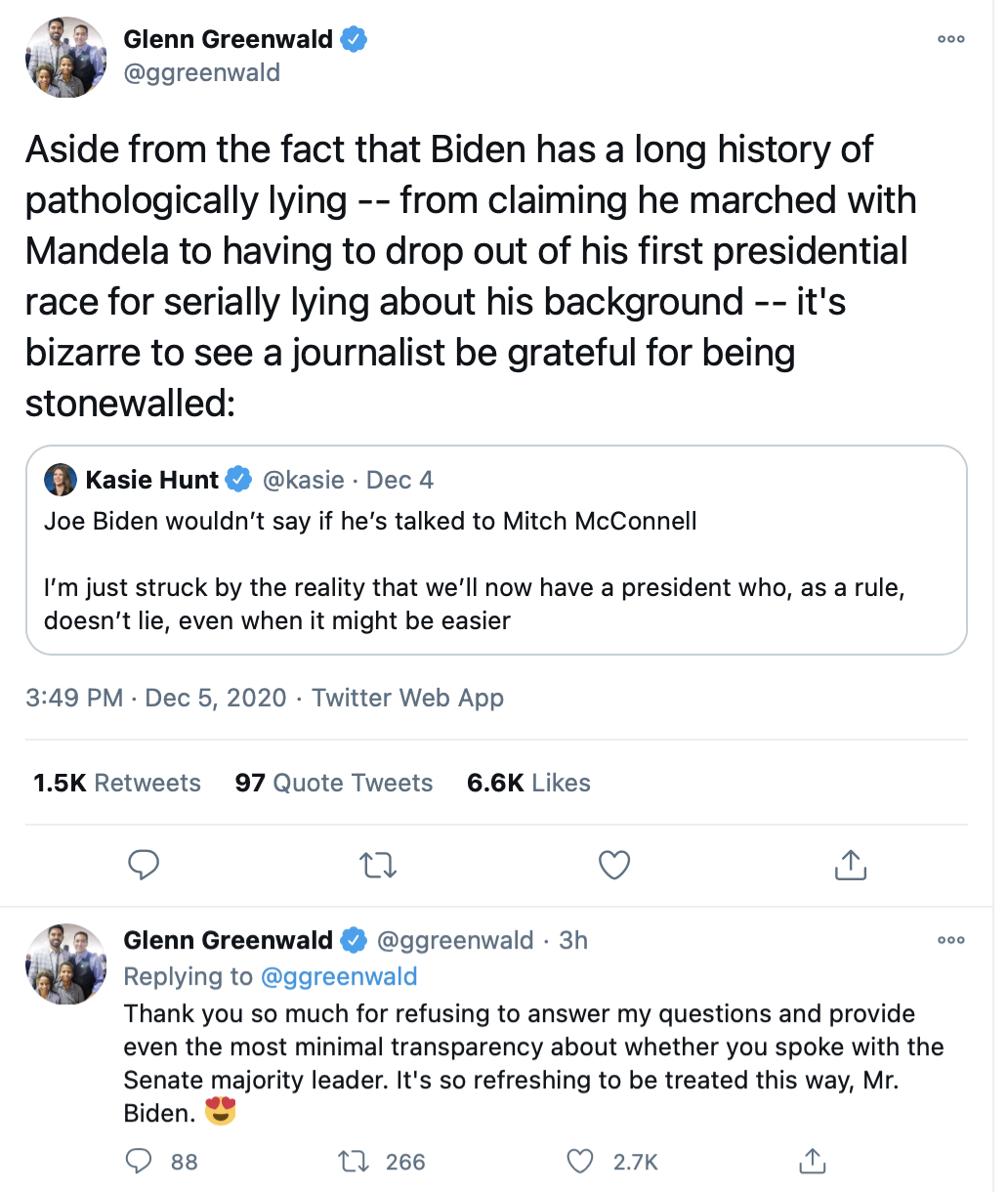Matt Taibbi Tells the Backstory of GameStop
Here's a reminder that there are two Americas. The backstory of GameStop.
Progressive News Media Abandons Julian Assange
It's amazing to watch the "progressive" media slip away and abandon one of the biggest First Amendment threats of our time. Not too long ago, progressive media outlets gave full-throated support for Assange. Are there any progressive voices still speaking out for a pardon for Julian Assange? There would be, except that thinking has clearly become a team sport these days.
What I Want for Christmas: Skeptical Coverage of Joe Biden by Legacy News Media
It's not a good sign that NBC's Kasie Hunt is fawning over Joe Biden, despite Biden's long and well-established history of being dishonest, which can be easily confirmed through Google by anyone with an open mind. What does it take to remind the legacy news media that it is their job to cover the news by refusing to ever trust politicians and by always following facts wherever they might lead. It is not their job to be cheerleaders for either political party, but here we are in an all-too-familiar place, though the script is now flipped. Do I need to say that I am writing this article as a person who voted for Biden primarily because I saw Trump as a much bigger threat?
For Christmas, Santa, make sure that news reporters take their jobs seriously. They need to blow the whistle on Biden whenever they see anything that doesn't add up and there will be plenty of it, just as there are in all administrations. I am also asking Santa to make sure that Biden keeps his promise to look out for the interests of ordinary Americans. Bernie Sanders he is not. Santa, don't be fooled by Biden's diverse-looking cabinet choices--he is loading up his cabinet with a neoliberal Who's Who of war hawks and players from big financial firms. Based on Biden's top ten contributors, Biden's favorite "clients" will likely be these big financial services corporations and you can bet they will be calling in their chips starting in January. Again, I am asking Santa to keep President Biden on a short leash for the next four years.
The Problem With Our Political Primaries
I will vote for Biden/Harris even though there is no rational way to justify how Biden should be the Democrat nominee. He is cognitively rickety and burdened with a long history of being on the wrong side of history (albeit with some notable positives). Today, Joe Biden is not among the best and brightest. I will vote for him anyway because Trump is much worse in terms of factual understanding, moral character and temperament. That said, what we're about to witness leading up to November is Kabuki Theater rather than a meaningful election because the corrupt primaries set the stage. But how did we get here, again? How dysfunctional were the primaries? Is there any expectation that the 2024 presidential primary will better reflect the will of the voters? No way, unless we dramatically reform the system from the bottom up.
Eric Weinstein nailed it on Episode 37 of his excellent podcast, "The Portal." I have taken the time to transcribe Eric's introduction to this episode. High school teachers should throw away their Civics coursebooks and start the court by making Eric's statement required reading:
Hello, it's Eric with a few thoughts this week on the coming US election before we introduce this episode's main conversation. Now, I should say upfront that this audio essay is not actually focused on the 2020 election, which is partially concluded, but on the election of 2024 instead. The reason I want to focus on that election is that precisely because it is four years away, we should know almost nothing about it. We shouldn't know almost anything about who is likely to be running or what the main issues will be. And we should be able to say almost nothing about the analysis of the election. Unfortunately, almost none of that is true. Now, obviously, we can't know all of the particulars. However, we still know a great deal more than we should. And that is because the ritual is not what many suppose it to be: a simple nationwide open contest to be held on a single day after several unrestricted long form debates with unbiased rules enforced by trusted referees.
What is most important is that prior to the 2024 election, there will have to be an appearance of a primary election. So what actually is a primary election and what function does it serve? It's hard to say, but if you think about it, this is really the awkward disingenuous and occasionally dangerous ritual by which a large and relatively unrestricted field of candidates needs to be narrowed to the subset that is acceptable to the insiders of the parties, their associated legacy media bosses in the party mega-donors. Now the goal of this process is to--in the famous words of Noam Chomsky--manufacture consent from us, the governed, so that we at least feel like we have selected the final candidates who, in truth, we would likely never have chosen in an open process. I've elsewhere compared this ritual to the related process referred to by professional illusionists as "magicians choice," whereby an audience member is made to feel that they've selected something like a card from a deck out of their own free will, but that the magician has actually chosen from a position of superior knowledge and control long before the trick has even begun.
In the modern era, of course, consent has become a much more interesting word, especially of late. And perhaps that fact is important in this context too. The constellation of issues carry over surprisingly well. To bring in more terminology from the national conversation on consent, the party rank and file are groomed, if you will, by the party-affiliated media as to who is viable and who should be ignored and laughed at through a process of what might be termed political negging. The candidates are also conditioned by being told that they can only appear in party-approved debates, which must be hosted exclusively by affiliated legacy media outlets, which emphasize soundbites and theatrical gotcha moments over substance, despite the internet's general move towards in-depth discussion made possible in large part by the advent of independent long-form podcasts like this one. Thus, both voters and candidates are prevented from giving informed and uncoerced consent by the very institutional structures most associated with democracy itself.
- Go to the previous page
- 1
- …
- 10
- 11
- 12
- 13
- 14
- 15
- 16
- …
- 77
- Go to the next page




